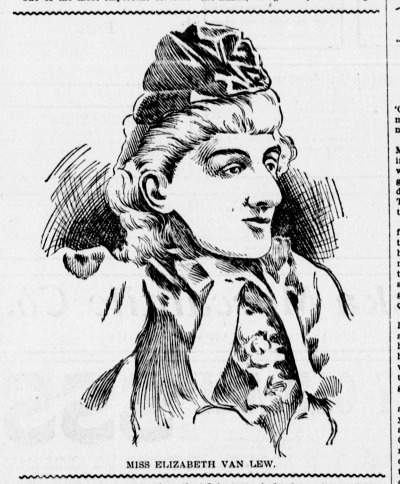From the Red Cloud (Neb.) Chief, 11/9/1900, p. 3, c. 1
“Beth” Van Lew, the Spy
Famous Woman Recently Passed Away
A strange and picturesque career was brought to a close by the recent death in Richmond, Va., of Miss Elizabeth Van Lew. Before the outbreak of the civil war, Miss Van Lew held undisputed sovereignty as the belle of Richmond. Her father was wealthy and surrounded her with all the advantages and luxuries that money could procure. The stately mansion which he built and in which his daughter reigned, remains to this day as one of the “show places” of Richmond. It stands on Church Hill and directly opposite the ancient St. John’s Church, where Patrick Henry made his memorable speech. Miss Van Lew never married and it is believed that a love affair embittered her life, but this belief is founded merely on gossip.
When the war commenced, she espoused the northern cause in opposition to the course followed by all her friends in the days of her social supremacy. Her relatives have attributed this action to the sentiments with which she became imbued while receiving her education in Philadelphia. At any rate the Van Lew mansion, “the mystery house on the hill,” became the headquarters of the operations of the federal secret service in Richmond. It was known to many southern leaders that Miss Van Lew was furnishing important information to the Union commanders, but so cleverly did she cover all traces of her operations that actual proof against her could not be obtained. It is said that her field of investigation embraced all the plans and actions of the Confederacy and its agents, both civil and military, and the valuable knowledge which she thereby obtained she communicated to General Grant.
One of the most important services which Miss Van Lew rendered to the north was in connection with the aid which she gave to the federal officers who escaped from Libby Prison. Not only did she shelter in her house those who were recaptured by the Confederates, but in many cases it was through her instrumentality that the success of her plans for escape became a possibility. She was constantly in communication with Libby Prison, and sometimes found it necessary to hide escaped prisoners for a long time before it was possible for them to get out of the city. She was a prime mover in the plot which resulted in the escape of Colonel Streight, the noted raider, who had been captured with 1,800 men by Forrest. Colonel Streight’s escape was accomplished by means of a tunnel constructed by the prisoners.
When General Grant learned of the evacuation of Richmond he immediately sent his aid-de-camp to see that his spy was properly cared for, and when she expressed a determination to continue to live in Richmond one of his first acts upon becoming president was to appoint her postmistress of the town, a position to which he reappointed her at the opening of his second term. During the Hayes administration she was deposed and, after a long struggle, finally secured a position in a department in Washington. The duties there were not pleasing to her and she finally resigned and returned to her old home.
In personal appearance Miss Van Lew was considerably under medium height, with gray curly hair and a thin, nervous face full of lines. To the day of her death, however, her eyes remained singularly keen and penetrating. It was impossible to converse with her and not appreciate that she was a woman of unusual education, but, on the other hand, her eccentricities were equally apparent. One of these took the form of a most rabid dislike to the payment of taxes of any kind. She contended that, inasmuch as she had no voice in the government, her property could not be taxed constitutionally and every check that she ever sent in payment of a tax fee was accompanied by a picturesque protest. For over two years previous to her death she had struggled against illness, a task made doubly difficult by her reduced circumstances. When death came, it found her in poverty, friendless and alone.

- Details
- Categories:: Other Newspapers After 1865 Elizabeth Van Lew Unionists and Spies Obituaries Deaths Women Politics Gender Churches and Religion Libby Prison Escapes Libby Prison Breakout Reconstruction in Richmond
- Published: 26 October 2017

